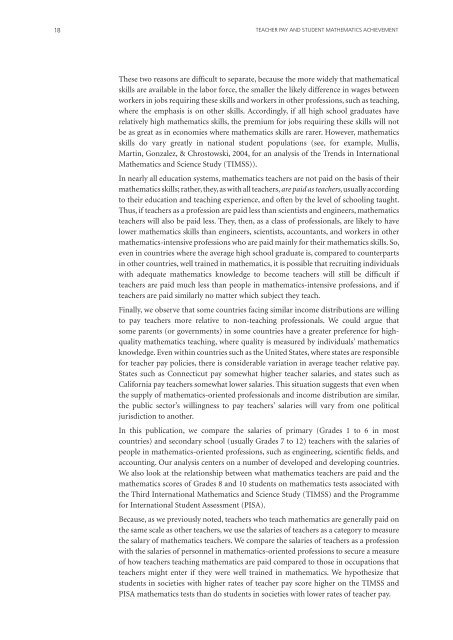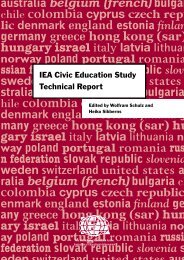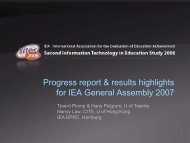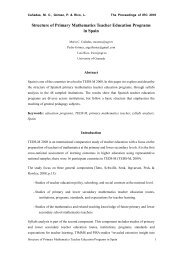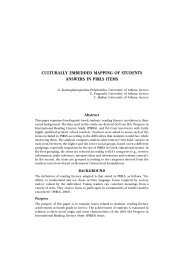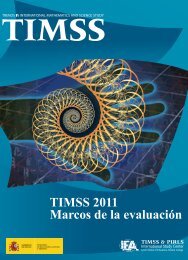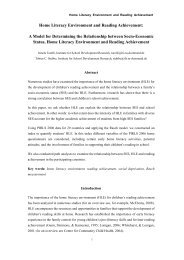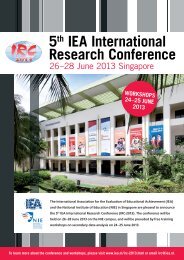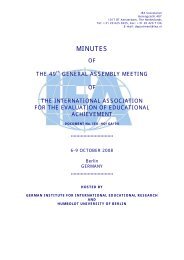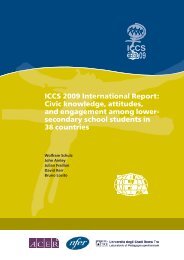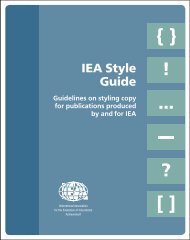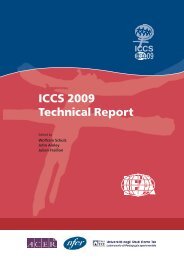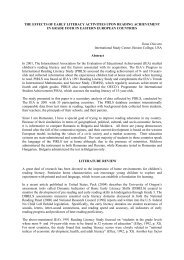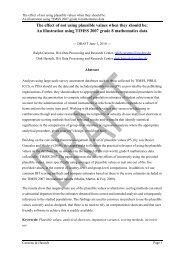Teacher Education and Development Study in Mathematics - IEA
Teacher Education and Development Study in Mathematics - IEA
Teacher Education and Development Study in Mathematics - IEA
You also want an ePaper? Increase the reach of your titles
YUMPU automatically turns print PDFs into web optimized ePapers that Google loves.
18<br />
TEACHER PAY AND STUDENT MATHEMATICS ACHIEVEMENT<br />
These two reasons are difficult to separate, because the more widely that mathematical<br />
skills are available <strong>in</strong> the labor force, the smaller the likely difference <strong>in</strong> wages between<br />
workers <strong>in</strong> jobs requir<strong>in</strong>g these skills <strong>and</strong> workers <strong>in</strong> other professions, such as teach<strong>in</strong>g,<br />
where the emphasis is on other skills. Accord<strong>in</strong>gly, if all high school graduates have<br />
relatively high mathematics skills, the premium for jobs requir<strong>in</strong>g these skills will not<br />
be as great as <strong>in</strong> economies where mathematics skills are rarer. However, mathematics<br />
skills do vary greatly <strong>in</strong> national student populations (see, for example, Mullis,<br />
Mart<strong>in</strong>, Gonzalez, & Chrostowski, 2004, for an analysis of the Trends <strong>in</strong> International<br />
<strong>Mathematics</strong> <strong>and</strong> Science <strong>Study</strong> (TIMSS)).<br />
In nearly all education systems, mathematics teachers are not paid on the basis of their<br />
mathematics skills; rather, they, as with all teachers, are paid as teachers, usually accord<strong>in</strong>g<br />
to their education <strong>and</strong> teach<strong>in</strong>g experience, <strong>and</strong> often by the level of school<strong>in</strong>g taught.<br />
Thus, if teachers as a profession are paid less than scientists <strong>and</strong> eng<strong>in</strong>eers, mathematics<br />
teachers will also be paid less. They, then, as a class of professionals, are likely to have<br />
lower mathematics skills than eng<strong>in</strong>eers, scientists, accountants, <strong>and</strong> workers <strong>in</strong> other<br />
mathematics-<strong>in</strong>tensive professions who are paid ma<strong>in</strong>ly for their mathematics skills. So,<br />
even <strong>in</strong> countries where the average high school graduate is, compared to counterparts<br />
<strong>in</strong> other countries, well tra<strong>in</strong>ed <strong>in</strong> mathematics, it is possible that recruit<strong>in</strong>g <strong>in</strong>dividuals<br />
with adequate mathematics knowledge to become teachers will still be difficult if<br />
teachers are paid much less than people <strong>in</strong> mathematics-<strong>in</strong>tensive professions, <strong>and</strong> if<br />
teachers are paid similarly no matter which subject they teach.<br />
F<strong>in</strong>ally, we observe that some countries fac<strong>in</strong>g similar <strong>in</strong>come distributions are will<strong>in</strong>g<br />
to pay teachers more relative to non-teach<strong>in</strong>g professionals. We could argue that<br />
some parents (or governments) <strong>in</strong> some countries have a greater preference for highquality<br />
mathematics teach<strong>in</strong>g, where quality is measured by <strong>in</strong>dividuals’ mathematics<br />
knowledge. Even with<strong>in</strong> countries such as the United States, where states are responsible<br />
for teacher pay policies, there is considerable variation <strong>in</strong> average teacher relative pay.<br />
States such as Connecticut pay somewhat higher teacher salaries, <strong>and</strong> states such as<br />
California pay teachers somewhat lower salaries. This situation suggests that even when<br />
the supply of mathematics-oriented professionals <strong>and</strong> <strong>in</strong>come distribution are similar,<br />
the public sector’s will<strong>in</strong>gness to pay teachers’ salaries will vary from one political<br />
jurisdiction to another.<br />
In this publication, we compare the salaries of primary (Grades 1 to 6 <strong>in</strong> most<br />
countries) <strong>and</strong> secondary school (usually Grades 7 to 12) teachers with the salaries of<br />
people <strong>in</strong> mathematics-oriented professions, such as eng<strong>in</strong>eer<strong>in</strong>g, scientific fields, <strong>and</strong><br />
account<strong>in</strong>g. Our analysis centers on a number of developed <strong>and</strong> develop<strong>in</strong>g countries.<br />
We also look at the relationship between what mathematics teachers are paid <strong>and</strong> the<br />
mathematics scores of Grades 8 <strong>and</strong> 10 students on mathematics tests associated with<br />
the Third International <strong>Mathematics</strong> <strong>and</strong> Science <strong>Study</strong> (TIMSS) <strong>and</strong> the Programme<br />
for International Student Assessment (PISA).<br />
Because, as we previously noted, teachers who teach mathematics are generally paid on<br />
the same scale as other teachers, we use the salaries of teachers as a category to measure<br />
the salary of mathematics teachers. We compare the salaries of teachers as a profession<br />
with the salaries of personnel <strong>in</strong> mathematics-oriented professions to secure a measure<br />
of how teachers teach<strong>in</strong>g mathematics are paid compared to those <strong>in</strong> occupations that<br />
teachers might enter if they were well tra<strong>in</strong>ed <strong>in</strong> mathematics. We hypothesize that<br />
students <strong>in</strong> societies with higher rates of teacher pay score higher on the TIMSS <strong>and</strong><br />
PISA mathematics tests than do students <strong>in</strong> societies with lower rates of teacher pay.


